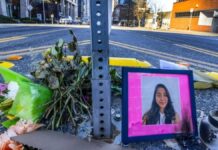
It’s been 50 days since people took to the streets after the police killing of George Floyd — and the nationwide protests haven’t let up since.
After demonstrators in Minneapolis called out the unjust killing of Floyd, a Black man, at the hands of a white police officer, protests quickly spread to cities and towns across the country and even the world. And now, over seven weeks later, while the unrest has quieted in some places, people continue to show up day after day in the name of anti-racism and ending police brutality.
In Louisville, Kentucky, for instance, residents have marched daily for weeks to demand justice for Breonna Taylor, a Black woman shot dead by police in her home in March. While one of the officers involved was fired — over three months after her killing and after weeks of protest — none of the three have been charged.
In Portland, Oregon, people have been protesting nonstop for nearly two months, with police — including federal law enforcement sent in two weeks ago by President Donald Trump — at times cracking down violently on demonstrators.
On Wednesday, a large crowd in Brooklyn, New York, others in Atlanta and over 100 protesters in Richmond, Virginia, all continued daily rallies in support of Black Lives Matter. And in Harper Woods, a Detroit suburb, hundreds gathered to call attention to the death of Priscilla Slater, a Black woman who died in police custody in June. On Thursday, protests continued in Seattle.
And demonstrations against racism and police violence are planned into the days to come in San Francisco, Philadelphia and beyond.
“Many of us recognize this moment as one to push even harder for transformation,” Kailee Scales, managing director of Black Lives Matter Global Network, told HuffPost’s Alanna Vagianos in late June of the then month-long, nonstop protests. “We know there are many new people finally listening to what we have been saying all along and now, it’s time for solutions until we are transformed.”
Since the demonstrations began, there have been significant changes in support of racial justice in local policy, corporate accountability and beyond. To name a few: protesters have toppled statues of racists in several cities; Mississippi lawmakers voted to change the state flag to no longer include a Confederate emblem; several school districts, including in Oakland, California, will no longer have police in schools; company executives accused of fostering toxic workplaces for staff of color resigned, including at Bon Appétit and Refinery 29.
But there is much more work still left to be done. It remains to be seen if cities that pledged to defund police and invest in communities of color will do so, or whether the Senate will pass the police reforms in the George Floyd Justice in Policing Act passed by the House last month. It’s now been over four months since Breonna Taylor was killed, and protesters continue to march daily, calling for the cops involved to be charged. Since Taylor and Floyd died, too many other Black and brown people have been killed by police.











